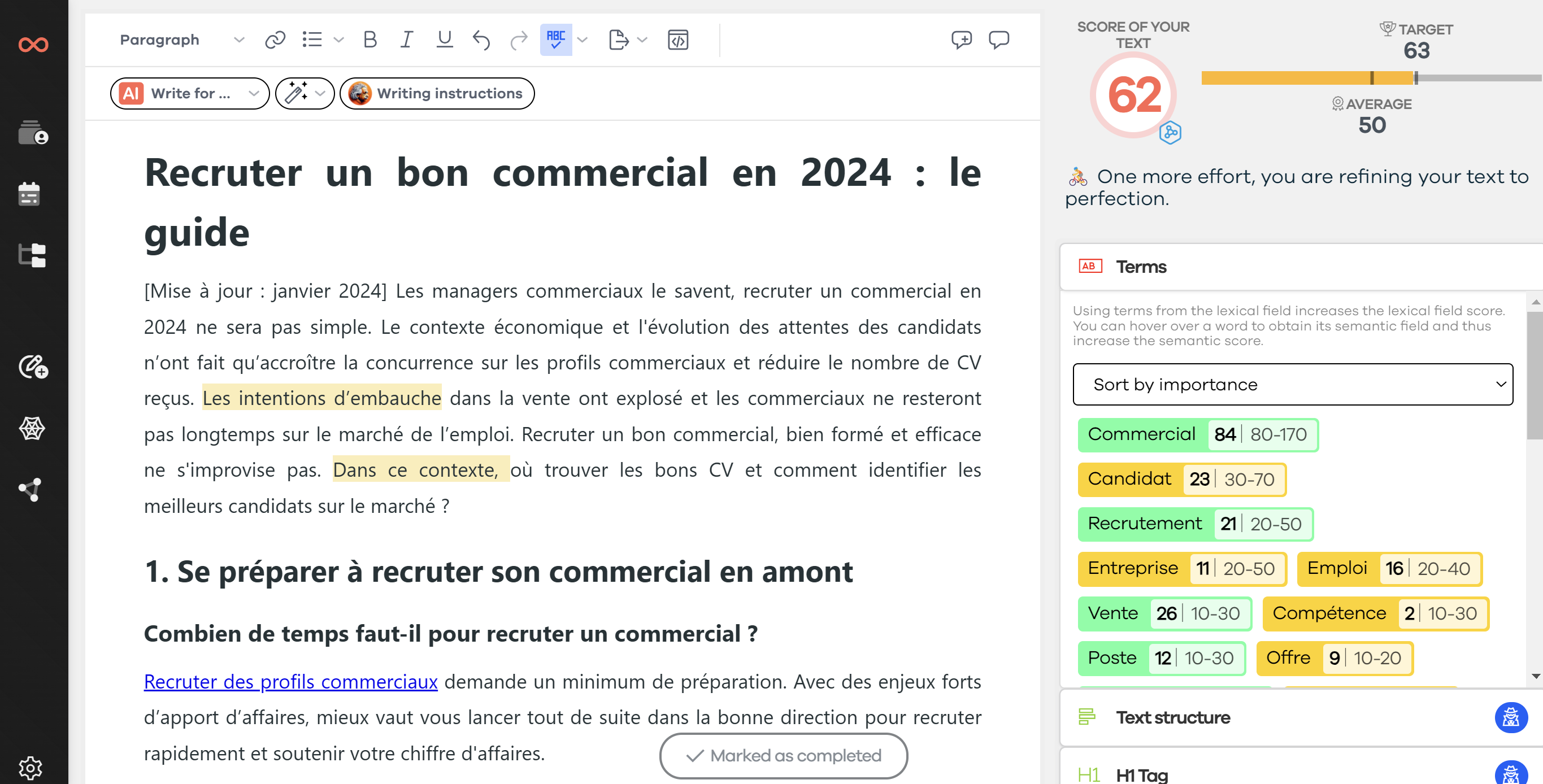The era of keyword stuffing and over-optimization is over! It's time for quality and safety! Since 2018, the implementation of Google EAT has aimed to protect users and provide verified information. In this blog post, I will explain everything you need to know about this algorithm. Discover what lies behind these three letters and how to improve your organic ranking accordingly. As a bonus, I will also tell you what to avoid doing to stay visible on Google.
🔎 Definition of Google EAT

To tell you more about this topic, I must first answer the following question: what is Google EAT? Behind this acronym are three keywords that represent the current requirements of the search engine:
- Expertise: the expertise
- Authoritativeness: the authority
- Trustworthiness: the trust (or credibility)
These criteria help to evaluate the quality of each web page, as well as an entire website. As you know, Google is increasingly becoming a response engine. That's why these criteria are essential for displaying results that perfectly match the user's search intent.
Google EAT was officially introduced in Mountain View in October 2020 in their search quality raters. This 175-page PDF (in English) reveals crucial information that had been kept secret until then. It details the search quality evaluation criteria more comprehensively than what was done in 2018. If you want to read this document, here is the link: https://static.googleusercontent.com/media/guidelines.raterhub.com/en//searchqualityevaluatorguidelines.pdf.
In the rest of this post, I will summarize everything you need to know about Google EAT.
👨💻 Evaluation Criteria of Google EAT
Now let's delve into these three elements of Google EAT. Only by fully understanding these criteria can you adapt your SEO strategy.
Expertise

Google EAT aims to display results that perfectly match the queries made. Your goal is to prove to search engines that you are an expert in your field. If this is not the case, I recommend hiring a specialized web copywriter, as the content author must demonstrate their legitimacy.
Moreover, the subject must be covered comprehensively and provide real added value to its reader. SEOQuantum allows you to measure the relevance of your content based on artificial intelligence specifically designed for this purpose.
Here are some indicators to demonstrate the reliability of your information:
- provide reliable sources to prove the accuracy of the page content;
- use a comprehensive semantic field to demonstrate the quality of the text;
- inform about the article's author to prove their area of expertise;
- add additional information by creating internal links;
- update the content to ensure the freshness of the information provided.
Authority

Beyond the web page itself, authority is essential across the entire website. To determine this element, Google pays particular attention to the links pointing to your site (backlinks). In addition, the mentions made of your brand and the citations taken from your texts are positive indicators.
To create effective link building, I remind you of the essential points of this pillar of organic SEO:
- Quality: the sites mentioning you must themselves provide quality content.
- Notoriety: links must come from sites with a good trust index (trust flow).
- Relatedness: the connection between two sites must respect a common theme.
Trust

This Google EAT factor could also be translated as credibility. Indeed, what the search engine wants are indicators of plausibility and safety. Just like expertise and authority, the information provided by the author, the web page content, and the entire website are taken into account.
By adhering to the following points, you will provide valuable information to Google for a chance to rank your site well in the SERP:
- Protected site: a secure site with an SSL certificate (URL starting with HTTPS) instills trust, both for indexing robots and users.
- Secure payments: a tool like 3D Secure allows for encrypting the data of credit cards used, for example.
- Legal notices: not only important for reassuring the Googlebot, they are also mandatory in France.
- Privacy policy: the confidentiality of the information transmitted is also an important element to guarantee a site's credibility.
- Certified reviews: a tool like Trustpilot ensures the authenticity of user reviews, which, of course, appeals to Google.
🎯 Sites Affected by Google EAT

Although Google EAT affects all websites, these criteria are particularly important for sites dealing with sensitive topics. Indeed, when addressing certain themes, incorrect information can lead to dramatic consequences. These are referred to as YMYL sites, an acronym for Your Money Your Life.
Ultimately, Google has found a way to combat "fake news" and other types of information that could have a negative impact on the well-being of its readers. Among these websites, we can particularly recognize those related to the following areas:
- Medicine: advice on all medical information, drugs, hospitals, or dangers associated with a specific activity.
- Legal: recommendations on laws and rights, such as adoption, divorce, immigration, or abortion.
- Finance: guidance on loans, taxes, various fees, and, more broadly, insurance.
- Governments: public institutions, voting, social services, or government agencies.
- Safety: information for travelers, dangers (political and ecological), political news, or wars.
- Groups of people: age, nationality, sexual orientation, or religion are extremely sensitive subjects that can lead to significant segregation.
- News: not all news sites are affected. Only those dealing with highly important topics are, such as economics, politics, or science.
- Online stores: to better protect users against various scams and provide information for making informed purchases.
- Others: there are still many sites that need to be closely monitored. Among the main themes analyzed by Google EAT, I would also mention nutrition, well-being, job and housing searches.
📈 SEO Adaptations to Google EAT Factors

Meeting Google EAT requirements to improve your organic ranking should be fully integrated into your content marketing strategy. Indeed, these are not one-time optimization actions, but the overall way you communicate.
Content
What hasn't changed since 2018 is that a web page must always provide quality content! Indeed, what I presented in this article is still relevant. What has been added in the new Google guideline mainly concerns the relevance of the information and the credibility of the site and author.
Since there are likely already hundreds (or even thousands!) of content pieces covering the same topic, your goal is to add value to your texts. To do this, don't just rephrase existing content. Gather the most relevant information and respond to the search intent as quickly as possible.
The writing quality must also be top-notch. The structure of Hn and spelling should be particularly well-crafted. Additionally, the subject must be covered comprehensively. By using SEOQuantum tools, you can perfectly develop your lexical and semantic fields.
Furthermore, if you are a recognized expert in your field, don't hesitate to sign your articles with your name. On the other hand, if your site provides general information, I strongly recommend hiring a specialized writer for the topic at hand. To demonstrate your website's expertise, working on your keyword clustering is also an excellent practice!
Technical
Today, obtaining an SSL certificate and offering a secure site in HTTPS has become extremely easy. Although it is not a factor that will propel your site to the top of search engine results pages on its own, it is a significant element when talking about Google EAT.
Secure payments are also an element to consider when setting up or optimizing your online store. The same goes for transparency regarding your company (legal notices) and data protection (privacy policies). If you haven't already, consider adding them to your site.
The indexing of your pages and redirects should also allow Google to provide quality results. Regular crawling of your website is therefore recommended to ensure the currency of your information.
Popularity
When talking about SEO popularity, we often think of link building. This is not entirely wrong! Indeed, by obtaining links from recognized sites, you have a good chance of improving your credibility.
However, when thinking about Google EAT, more than just quality backlinks are needed. Your brand image is also taken into account. To develop it on the web, you should also refine your social networks and be present and responsive with your community. Reviews of your brand and your presence are factors to consider when developing your digital reputation!
❌ SEO Practices to Avoid with Google EAT

You now know the best SEO practices to improve your Google EAT score. Conversely, there are also bad SEO practices to avoid at all costs. In general, remember that quality takes precedence over quantity!
- Do not write low-quality, uninteresting texts just because you heard that you should publish weekly on your blog.
- Do not create a maximum number of low-quality backlinks in a short period just because your direct competitor has more than you.
- Do not write about subjects you are not familiar with or that do not match your site's theme, even if you want to create buzz.
- Do not provide incorrect information about your company or customer reviews.
- Do not start creating a generalist site thinking it will attract maximum traffic.
- Do not create duplicate content, whether internal or external.
- Do not mention dubious sources that do not meet Google EAT's quality criteria themselves.
Thanks to Google EAT, the results displayed on the search engine are of higher quality. They respect the user's search intent while ensuring the accuracy of the information provided. The main goal is to protect the health (physical and mental) of Googlers and improve their safety (financial and social). To improve your visibility on Google, you must follow the proper procedures detailed in this article.
- Provide quality to your readers.
- Protect them in their transactions.
- Respect their privacy.
- Be sincere and transparent.
- Develop your area of expertise.
- Take care of your company's brand image.
These elements must be an integral part of your SEO strategy. To learn more about this topic, feel free to read the following post: https://www.seoquantum.com/billet/strategie-SEO.
Need to go further?
If you need to delve deeper into the topic, the editorial team recommends the following 5 contents:

